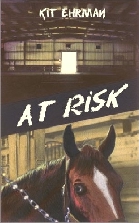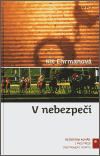Gotta Write Network Interview by Cindy Spears, 2003
AT RISK
Kit Ehrman Focuses on the World of Horses
Interview conducted by Cindy Speer
A visit to Kit Ehrman's website will show you a long list of favorable quotes from some pretty impressive review places. A lot of people are comparing this new talent with Dick Francis and they may not be far off. Both have extensive experience in the world of horses, experience that pays off in a true and realistic grasp of that world. I had the pleasure of interviewing Ms. Ehrman, and found out that she doesn't mind the comparisons at all and that AT RISK is only the first book in what many are hoping will be a ling running series.
Cindy: I read that you started writing because you had a lot of free time mucking out the stalls, and had all these stories in your head...if this true, and if so, what was the final straw that made you actually sit down and start to write?
Kit: Actually, this is true. I've never minded mucking stalls because you get instant results, like vacuuming a dirty floor, but it's not the most thrilling thing in the world to do. I don't know what everyone else does when they're cleaning stalls, but I got into the habit of making up stories in my head as a form of self-entertainment. They weren't at all developed, and I didn't do anything with them until I decided to write. And I know you've heard this answer before. I was reading a well-written, funny mystery, but toward the end of the story, the author let her protagonist do something that obviously put her life in danger, which irritated me, and I thought, I can do better than this. Of course, I quickly found out that it isn't as easy as it looks, especially in an amateur sleuth mystery where you're trying to build suspense, but at the same time, you want your protagonist to come across as a reasonably intelligent person.
Cindy: The comparisons between your work and British mystery writer Dick Francis are inevitable...how do you feel about this? Do you think there are any influences in your work? The way Francis connects his series is that (usually) each character is different, the linkage is some aspect of the horse world...do you plan to do this, or will the main line of your series be based around the character?
Kit: I expected that there would be comparisons, given the subject matter, and whenever I'm favorably compared to Dick Francis, I'm thrilled, even if I don't always feel deserving of the praise. And he has influenced my writing simply because I've read him. I hope I learn something from every author I read. But he's influenced my life in other ways. Many, many years ago, I was working for the government when I happened to find IN THE FRAME, an earlier Dick Francis novel. I read it and loved it, and before I knew it, I'd read all that he'd written. Anyway, I was so enamored with the horse world he described, I quit the government job and went to work on a horse farm, and I've worked with and owned horses ever since.
My series will follow the exploits of my main character, Steve Cline.
Cindy: How did you create Steve Cline? Do you think creating a character for a series is different from creating one for a standalone story?
Kit: For AT RISK, I started with an idea for the beginning: seven horses are stolen from a hunter/jumper barn in the middle of the night, and what would happen if the barn manager interrupted the theft? That kicked off the story, so I knew right away that my protagonist would be the barn manager. Then I had to consider what kind of person would do that job. Mystery readers are pretty sophisticated, so I didn't think that a middle-aged man would be a good choice. In a fictitious world, anyway, one would hope that he would have moved on to something more challenging by the time he's in his late twenties. So, I made him twenty-one, which was challenging from a writer's standpoint. He had to be smart enough and determined enough to solve the mystery and still be immature enough to be believable.
I think creating a character for a series is definitely different from creating one for a standalone, not that I knew this when I began to write. A series character has to be interesting enough to keep the reader's attention throughout the series. Having issues that the protagonist has to deal with and overcome is a useful tool for the writer. Another important aspect is the protagonist's vocation. The job has to be flexible enough that the potential story lines aren't limited, or else the series will become stagnant. In a standalone, the author doesn't have to worry about that. In Steve's case, he hasn't figured out what he wants to do with his life yet, which opens up many avenues but is risky at the same time, because some readers might not be happy with where I take him.
Cindy: Actually, that leads to my next question. Do you think writing a series is different from writing a standalone? Is the set up of the basic framework different? Did you find yourself holding things back for the next book?
Kit: Where the difference between writing a standalone versus writing a series comes into play is how the author develops and gradually exposes long standing problems that the protagonist has to deal with and overcome. In a standalone, everything needs to be wrapped up by the end of the book, and the author probably won't be able to go into all the character's complexities because of lack of time. And the reader doesn't necessarily want them to do that, anyway. In a series, you can expand on the main character's difficulties at a more leisurely pace. In each book, you let the reader learn a little more about what has happened in the protagonist's past that has had a profound impact on him and has made him the person he's become.
When I wrote AT RISK, I wasn't really thinking "series," but I knew I had to give Steve problems that he had to deal with, besides the mystery, to make the story more interesting for the reader. My obvious choice for someone so young was family conflict. When AT RISK opens, Steve's essentially estranged from his wealthy father. He's on his own and struggling to make the rent. Although he doesn't realize it, his relationship with his father is the driving force behind much of his risk taking. Technically, I didn't hold anything back, because I still hadn't completely defined their father/son relationship, but if I'd had a long-range plan initially, I would have held elements back for future novels, but it worked out okay, anyway.
When I started the sequel, I delved deeper into why they didn't get along, and that reason, when revealed, essentially kicks off book two. No matter how far the series goes, something as important as a father/son relationship should have a bearing on how Steve handles things in future books. For instance, he may have a difficult time forming lasting relationships, and it would affect what kind of father he is if he has children.
So, when you start a series, you don't need to know everything. That would pretty much kill off any creativity for many writers. And many authors don't write to a strict plan. You just need to have some issues that you intend to develop as the series progresses.
Cindy: What other projects are you working on? What things have you done in the past?
Kit: Besides trying to finish the sequel, I wrote a short story for a mystery anthology structured around a Kentucky Derby theme. AT RISK is basically my first attempt at writing.
Cindy: I thought that www.kitehrman.com was a really nifty site...do you think having a web site is important for a writer? Do you have any plans for it?
Kit: Thanks Cindy. I think a website is an excellent way for authors to showcase their work. Every piece of promotional material I hand out has the web site address printed on it, and I try to remember to add it to my sig line in e-mails. It's basically an extremely flexible, colorful press kit that anyone can look at. So far, I haven't been impressed with traffic to the site, so I think I'm doing something wrong with getting it "out there," but I imagine this will improve over time. I also believe that having a web site makes an author appear more professional to the public. I enjoyed putting the site together and hope to expand on it. I'm looking forward to adding information on the sequel, and I occasionally run contests.
Cindy: What kind of things do you do to help publicize your book? Do you think the Internet has placed more of a burden on writers in this aspect, or do you think it's helping?
Kit: I don't look at the Internet as a burden but as another avenue that authors can exploit when promoting their work, and it's often free, which is great. I advertise my books on horse web sites when there's no charge, and I add a link to my site wherever I can. I go to mystery conventions when I can, which is not nearly as much as I'd like. I sent out lots of press kits when AT RSK was first released, requesting interviews and/or book reviews, with zero success, and I believe my mistake was that I didn't follow up with phone calls. I arrange book signings when I can, go to book festivals, and meet with book clubs. And because of the horse connection, I promote at horse shows, too. And a low key but effective way to promote a book is sending out postcards. I send them to libraries, bookstores, tack stores, and stables, especially in Maryland where the story takes place. I'm taking out an ad in a local horse magazine, and I'm looking into putting an ad in a national equine publication. But everything I've done doesn't come close to matching the effectiveness of AT RISK's early reviews that were generated thanks to the efforts of the folks at Poisoned Pen Press.
Cindy: When you're not writing...or cleaning stalls...what can we find you doing?
Kit: Cleaning the house, which I hate much more than cleaning stalls. Actually, this time of year--mowing grass.
Cindy: If you had to choose only one word to describe yourself as an author, what would it be?
Kit: Lucky.
Cindy: What is your favorite aspect of writing? How do you describe your writing process?
Kit: I love it when I get into the story so deeply, I feel like I'm there. I love it when the story creeps into my mind no matter what I'm doing. But what I love most is finding out that someone else has enjoyed the story.
I write a pretty clean first copy. I don't mind going slowly and getting in all the details and trying to address dialogue and action and pace and setting all at once. The most important aid for me is visualizing the scene as I write it, like I'm watching a movie. I sometimes have to remind myself to picture it, and that helps me write details that I might not have thought about otherwise. Plotting is my weakness, so I try to have two schemes going on in the same story so that one complicates the other and keeps the reader off balance a little. And I always have to go back through the story from each character's viewpoint and think about what his goal is and how he's feeling and why he's acting in a particular way.
Unfortunately, I have no writing schedule that I adhere to. I write whenever I can. It doesn't matter if it's the middle of the day, late at night, or first thing in the morning. Weekends are the best. Each time I come back to the computer, I read over the previous day's work, edit, then pick up from there. If I've been away from the story for a while or I feel stuck, I might go back an entire chapter to get into the story.
K i t E h r m a n . . .
AT RISK FUN LINKS . . .
Columbia Horse Center is the "real-life" Foxdale Farm, Steve's base of operation.
The folks at the Laurel Police Department were a big help to me regarding police procedural questions.
Do You Speak Czech?
If you know someone in the Czech Republic who likes mysteries, AT RISK is available there from Olympia for 179 Kc.
V NEBEZPECI
by Kit Ehrmanova
Site content copyrighted 2006/2007 by Kit Ehrman. top of page
Louisville Skyline photo by Fleur-Design.net
Horse photo by Mike Corrado

Hardcover
October, 2002
ISBN: 1-59058-036-2
$24.95
Trade Paperback
August, 2006
ISBN: 1-59058-265-9
$14.95
REVIEWS . . .
"It's amazing what horses can do for a mystery. Kit Ehrman's debut novel, AT RISK, reeks of authen-ticity, and the hunters and jumpers that are boarded at this no-frills garage have personality to burn. When seven of these horses are stolen in the dead of night, Stephen Cline, the 21-year-old barn manager . . . in the honored tradition of a Dick Francis hero, vows to track down the thieves..."
~ The New York Times
"The smart money could make the unusually likable protagonist a favorite in the Francis Stakes."
~ Kirkus
"Both horse lovers and crime fans who've never stepped into a stirrup will relish Ehrman's riveting debut . . . Ehrman treads Dick Francis territory with a sure foot [and] has created a mem-orable cast. With his youthful zeal and perseverance, Steve Cline makes a captivating hero and sleuth, one readers will be eager to see again."
~Publishers Weekly
"At best, only a small fraction of first novels turn out to be first in a series (why assume that success for AT RISK?) The over-arching reason is that its author is thoughtful and clever, as well as skilled. Ehrman's writing is unob-trusively crisp . . . The plot is intricate, intriguing, and solid in the best tra-ditional style . . ." (see the complete review-->)
~ The Drood Review
"AT RISK by Kit Ehrman is suspense on steroids and one of the best debut novels to hit the crime literature racetrack since Dennis Lehane's A DRINK BEFORE THE WAR. Clear ample shelf space for a Steve Cline series because Ehrman, a real-life horse farmer, has hit for the literary trifecta."
~ Andrew McAleer of Austin Layman's Crimestalker Casebook




